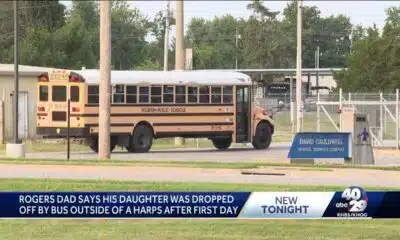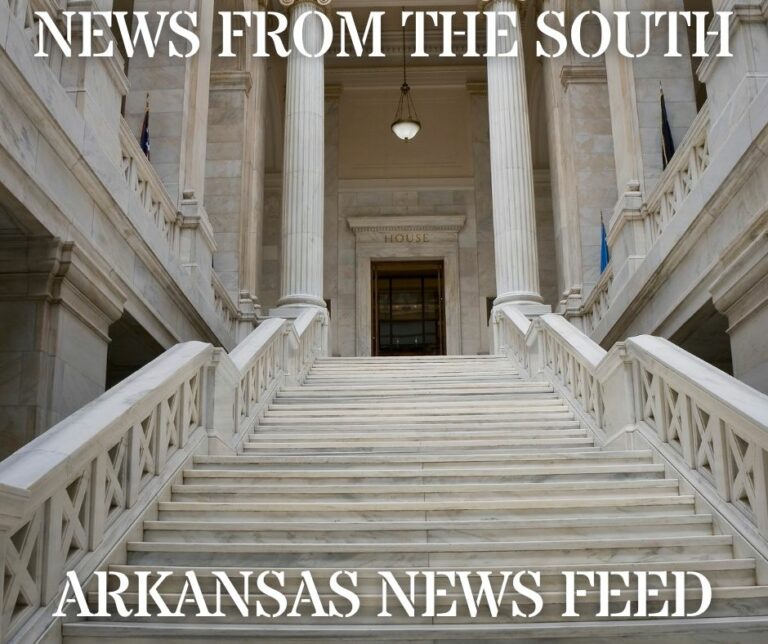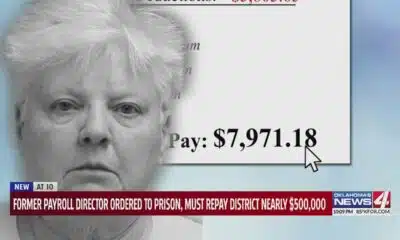News from the South - Kentucky News Feed
Abe Lincoln took a leap long before Texas Democrats skipped town
by Berry Craig, Kentucky Lantern
August 14, 2025
There’s historical precedent for Texas House Democrats vamoosing to deny Republicans the quorum they need to carry out President Trump’s order and redraw the Lone Star State’s congressional map to flip five seats from blue to red before next year’s midterm elections.
Some of the Texans fled to Illinois, where in December, 1840, a 31-year-old Kentucky-born Whig state representative jumped out a window to thwart a quorum House Democrats needed to pass a bill undermining the Bank of Illinois, a Whig pet.
The solon’s name was Abraham Lincoln.
His unorthodox exit went for naught because he had been marked present. The majority Democrats corralled enough members for a quorum, and the anti-bank bill passed 46-15.
Understandably, it’s been claimed that Lincoln leapt from the Illinois statehouse, which is preserved as the Old State Capitol Historic Site. He didn’t. He bailed from a church window.
Springfield is the capital of Illinois. But in late 1840, the legislature was meeting in the old First Methodist Church while work crews were putting the finishing touches on the Capitol a block away. (The building was replaced by the current Capitol in 1876.)
The church was too small and ill equipped to adequately accommodate the lawmakers, which “added to the confusion Lincoln encountered as leader of the minority Whig party,” explains a plaque on a downtown building now on the church site.
The blue-framed “Looking for Lincoln” tablet is titled “Leaping Lincoln.”
On Dec. 5, 1840, the Democratic majority was set to approve the bank-busting bill. The Whigs decided to make themselves scarce, thus preventing a quorum. “Only Lincoln and a few lieutenants remained to observe,” according to the plaque.
When Lincoln and other Whig bigwigs discovered the Democrats had a quorum after all, they ran for the door, which was barred. In desperation, Lincoln leapt, followed by Joseph Gillespie and Asahel Gridley.
The State Register, a devoutly Democratic newspaper in Springfield, gleefully reported the incident: “A laughable circumstance took place while the yeas and nays were being called on the passage of the resolution. Mr Lincoln of Sangamon (Lincoln lived in Springfield, the Sangamon County seat), who was present during the whole scene, and who appeared to enjoy the embarrassment of the House, suddenly looked very grave after the Speaker announced that a quorum was present. The conspiracy having failed, Mr Lincoln came under great excitement, and having attempted and failed to get out of the door, very unceremoniously raised the window and jumped out, followed by one or two other members.”
It was a first floor window, said to be only 4 or 5 feet from the ground.
According to the paper, “This gymnastic performance of Mr Lincoln and his flying brethren, did not occur until after they had voted! and consequently the House did not interfere with their extraordinary feat.”
Why congressional redistricting is blowing up across the US this summer
The State Register confessed, “We have not learned whether these flying members got hurt in their adventure, and we think it probable that one of them came off without damage, as it was noticed that his legs reached nearly from the window to the ground!”
The paper further lampooned the 6-foot-4 Lincoln, declaring it had heard “that a resolution will probably be introduced into the House this week to inquire into the expediency of raising the State House one story higher, in order to have the House set in the third story! so as to prevent members from jumping out of the window! If such a resolution passes, Mr Lincoln will in the future have to climb down the spout!”
The plaque also says that “an embarrassed Lincoln ever after resented references to what he called that ‘jumping scape.’ ” But he had the last laugh 20 years later when Free State voters sent him to the White House. (He polled just 1,366 votes in slave state Kentucky.)
Historians rank “The Great Emancipator” as one of our greatest presidents because he led the Union to victory in the Civil War and put slavery on the road to extinction. (Illinois towns were named for Gillespie and Gridley.)
YOU MAKE OUR WORK POSSIBLE.
Kentucky Lantern is part of States Newsroom, a nonprofit news network supported by grants and a coalition of donors as a 501c(3) public charity. Kentucky Lantern maintains editorial independence. Contact Editor Jamie Lucke for questions: info@kentuckylantern.com.
The post Abe Lincoln took a leap long before Texas Democrats skipped town appeared first on kentuckylantern.com
Note: The following A.I. based commentary is not part of the original article, reproduced above, but is offered in the hopes that it will promote greater media literacy and critical thinking, by making any potential bias more visible to the reader –Staff Editor.
Political Bias Rating: Center-Left
This content frames a contemporary political event—the Texas Democrats fleeing the state to deny a quorum to block redistricting efforts—within a historical context featuring Abraham Lincoln, a figure commonly associated with the Republican Party’s anti-slavery and unionist legacy. The article appears to sympathize with the Democrats’ tactic by drawing a parallel to Lincoln’s similar use of procedural measures, highlighting historical precedent for blocking what is portrayed as a partisan redistricting effort by Republicans. While it is generally factual and does not overtly criticize either party, it leans slightly towards a pro-Democratic perspective by emphasizing the legitimacy and historical tradition of such political maneuvers, which aligns more with a center-left viewpoint.
News from the South - Kentucky News Feed
Med Center Health to host Annual Women’s Conference
SUMMARY: The Medical Center in Bowling Green will host its annual women’s conference, “A Day Just for Women,” on Thursday, Oct. 2, from 8 a.m. to 2 p.m. at the Knicely Conference Center. The event features motivational speaker Nancy Witter, known for uplifting, humorous storytelling focusing on self-worth and women’s impact. Emily Davenport, a women’s health clinical specialist, will present on pelvic floor health, joined by OB-GYN and Urology providers for Q&A. Attendees will also access health screenings and local vendor booths. Registration is $70, including meals and materials, with corporate tables available. Early registration is recommended.
The post Med Center Health to host Annual Women’s Conference appeared first on www.wnky.com
News from the South - Kentucky News Feed
Unsealed warrant reveals IRS claims of millions in unreported sales at Central Kentucky restaurants
SUMMARY: Federal court records reveal an IRS investigation into two Central Kentucky restaurants, Mi Pequeña Hacienda locations in Lexington and Nicholasville, accused of underreporting millions in sales from 2019 to 2023. IRS agents found credit card deposits alone exceeded reported gross revenue during multiple years, with the Nicholasville site allegedly understating receipts by $758,000 and the Lansdowne Drive site by $1.6 million, totaling $2.35 million in unreported sales. A 2024 undercover meeting labeled one location a “cash cow” with income far higher than advertised. During searches, agents seized extensive financial and business records. No charges have been filed yet.
The post Unsealed warrant reveals IRS claims of millions in unreported sales at Central Kentucky restaurants appeared first on lexingtonky.news
News from the South - Kentucky News Feed
In Kentucky, we’ve spent years growing talent — only to have Washington slam the door
by Nicholas D. Hartlep, Kentucky Lantern
August 15, 2025
While the nation was distracted by headlines about celebrity trials and summer storms, a seismic shift occurred in American education policy: The U.S. Department of Education was effectively gutted by President Donald Trump’s so-called One Big Beautiful Bill Act.
Billed as a move to return power to the states, this legislation dismantles the infrastructure of federal student aid, guts Pell Grants, halts income-driven repayment programs and eliminates Public Service Loan Forgiveness. The Pell Grants program is a lifeline for low-income students that covers up to roughly $7,400 annually, but still leaves significant unmet need.
The implications of these changes are catastrophic — and not just for students. This law represents a total abandonment of education as a public good, and the consequences will be felt in every community, including right here in Kentucky, where the median household income is just $58,000 and more than 40% of college students depend on federal aid.
As someone who has spent years researching and writing about student loan debt, I know how fragile our current system already is: Tuition costs continue to outpace inflation, repayment programs are cumbersome and inconsistent, and federal aid has never kept pace with the true cost of attending college. But the new law doesn’t fix what’s broken — it breaks what was barely holding together, by closing pathways to professional advancement for future lawyers, teachers, doctors and scientists.
Ending income-based repayment and Public Service Loan Forgiveness means new doctors — who typically start their careers with six-figure debt — will be forced into unaffordable standard repayment schedules. Without the safety net of income-based repayment or the promise of forgiveness after serving high-need communities, many will abandon medical training altogether or avoid practicing in rural and underserved areas where salaries are lower.
These changes come as the U.S. faces a looming doctor shortage, especially in rural areas like Kentucky. But this law makes it harder than ever to grow our health care workforce.
The blow is even worse for aspiring doctors of color. In 2023, only 5.7% of active physicians in the U.S. were Black, despite Black Americans making up over 13% of the population. Latino, Indigenous and low-income communities are similarly underrepresented. How do we close health disparities if we close the door on the very students who would serve these communities?
This issue is personal for me, not just as a scholar of education and student debt, but as a father. My daughter recently graduated from Frederick Douglass High School in Lexington, where she completed the biomedical sciences magnet program, part of the nationally renowned Project Lead the Way curriculum. She is now headed to Amherst College to study pre-med, with dreams of becoming a physician.
Her journey exemplifies what’s possible when a school district invests in excellence. Under the leadership of Superintendent Demetrus Liggins — who was just named Kentucky Superintendent of the Year — Fayette County Public Schools are preparing students to lead, innovate and serve.
How can a district so effectively prepare its students for college, only to have college become unreachable or unsupportive due to federal abandonment? This is the contradiction that cuts to the heart of America’s education crisis: We spend years cultivating brilliance in our youth — only to shrivel the pipeline at the very moment it matters most.
Yet Kentucky’s elected leaders have largely abandoned the state. U.S. Sen. Mitch McConnell, who once championed Pell Grants, has quietly voted in favor of the act. U.S. Rep. Andy Barr, who represents Lexington and many of our college towns, not only voted in favor of the act, he championed it. And U.S. Rep. Thomas Massie was so committed to gutting the federal Department of Education that he reintroduced the bill to abolish it.
These voting patterns aren’t surprising. The National Education Association legislative report gave all of Kentucky’s Republican congresspeople and senators a grade of F. Only a few officials, like U.S. Rep. Morgan McGarvey, have spoken out against these cuts. McGarvey shows how we Kentuckians can build a new coalition for higher education — one that is bipartisan and unapologetically pro-learning.
We must pressure our elected officials in Kentucky to restore federal student aid, reinvest in Pell, and protect public institutions by ensuring they have stable federal funding, guardrails against state disinvestment and the capacity to serve all qualified students regardless of family income.
Higher education should not be rationed to the wealthy. It must remain a public commitment — a bridge to careers, to service, to self-determination. Without it, we abandon not only students, but the very idea of a society in which talent — not zip code or family circumstance — shapes one’s future.
Kentucky Lantern is part of States Newsroom, a nonprofit news network supported by grants and a coalition of donors as a 501c(3) public charity. Kentucky Lantern maintains editorial independence. Contact Editor Jamie Lucke for questions: info@kentuckylantern.com.
The post In Kentucky, we’ve spent years growing talent — only to have Washington slam the door appeared first on kentuckylantern.com
Note: The following A.I. based commentary is not part of the original article, reproduced above, but is offered in the hopes that it will promote greater media literacy and critical thinking, by making any potential bias more visible to the reader –Staff Editor.
Political Bias Rating: Left-Leaning
This content critiques a policy associated with former President Trump and Republican lawmakers, emphasizing the negative impacts on federal student aid and higher education accessibility. It advocates for increased federal support for education and highlights social equity concerns, aligning with progressive and left-leaning perspectives on education policy and social justice. The tone and framing suggest opposition to conservative education reforms and support for a more robust public education system.
-
News from the South - Oklahoma News Feed7 days ago
Former payroll director ordered to prison, must repay district nearly $500,000
-
News from the South - Tennessee News Feed7 days ago
Dollywood shares hints about new attraction coming in 2026
-
News from the South - Georgia News Feed7 days ago
Patrick Joseph White: Who is the accused Emory and CDC shooter?
-
Local News5 days ago
Bay St. Louis artist commemorates Amtrak’s return with hundreds of handmade medallions
-
News from the South - Arkansas News Feed3 days ago
Idaho is losing OB-GYNs. Doctors who remain are trying to shoulder the extra burdens.
-
News from the South - Georgia News Feed5 days ago
RCSS: Students showed growth on Georgia Milestones Assessments for 2024-2025
-
News from the South - Florida News Feed4 days ago
Partly cloudy and warm across South Florida, a few scattered showers possible
-
News from the South - Georgia News Feed7 days ago
Shooter who attacked the CDC headquarters was a 30-year-old man from suburban Atlanta








































